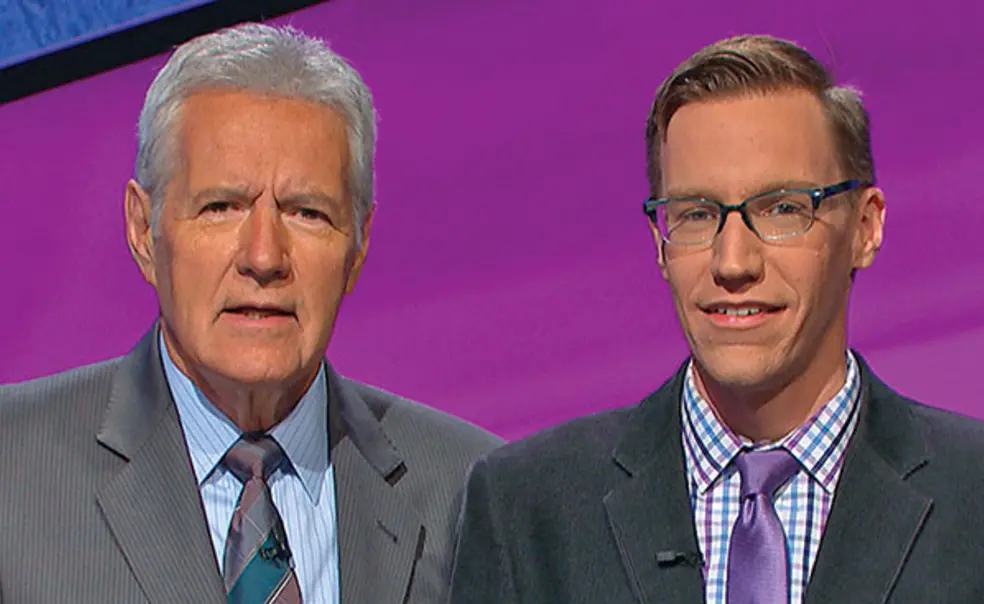Nick Spicher ’01: ‘What is 15 Minutes of Viral Infamy,’ Alex?
It was Spicher’s first appearance in a two-night run. He was leading by a significant margin. Off-camera, a producer asked the competitors to turn their backs while the judges conferred about one of Spicher’s answers. The discussion lasted about five minutes, says Spicher, the program-innovations manager at the Imagine Children’s Museum in Everett, Wash., but it felt longer. Then the executive producer broke the news: Spicher’s answer — first deemed correct — was wrong. He lost $3,200, dropping to second place.
Spicher’s response was in a category called “Music and Literature Before and After,” which required contestants to combine terms from music and books. The clue was, “A song by Coolio from Dangerous Minds goes back in time to become a 1667 John Milton classic.” Spicher replied: “What is Gangster’s Paradise Lost?”
“Gangsta’s,” the judges belatedly corrected, after their off-camera talk. Not “Gangster’s.”
“I’m sure I had a, ‘like, really?’ kind of moment,” Spicher says, “but it wasn’t anything I had much time to think about. It was kind of funny, and you just move on with the game.”
Despite the setback, Spicher won, taking home $15,201. After filming, he had a good laugh with his competitors, one of whom told him that he’d have a great story to tell: How many Jeopardy! contestants could claim that host Alex Trebek taught them the proper pronunciation of “gangsta”?
As it turns out, Spicher didn’t need to tell the story. The internet did it for him.
By the next morning, a Tuesday, comedian Roy Wood Jr. had tweeted a clip of the incident to more than 100,000 followers. “Let Nick’s mistake be a lesson to us all,” Wood wrote. “In 2018, you gotta keep it gangsta at all times.” As of early March, it had received nearly 90,000 likes, and the YouTube clip was viewed more than 3.4 million times.
By Tuesday evening, friends were sending Spicher links to news articles about his mistake. Wednesday brought cable news, morning radio shows, and an article in The New York Times. Everyone was talking about him, it seemed, but very few were talking to him — not that he really wanted either.
“It builds on itself,” Spicher says, “in this kind of house-of-cards fashion.”
On Wednesday afternoon, media outlets in Everett wanted to speak to the museum employee who committed the viral quiz-show flub. Spicher did a couple of interviews, using the opportunity to promote the museum’s new science program. On Friday morning, Spicher cued up his favorite podcasts — and found that two of them, NPR’s It’s Been a Minute and Slate’s Lexicon Valley — were discussing him. More than any other bit of publicity, he says, the podcasts made everything “more personal somehow.”
A producer for Jimmy Kimmel Live! attempted “very aggressively” to reach out to him, Spicher says, sending him messages on Facebook, LinkedIn, and Twitter, and calling his museum. “‘The creative is still being worked out,’” Spicher says the producer told him, “which strikes me as a very Hollywood kind of phrase to say ‘we don’t know what we’re doing yet.’”
What they did know was that they wanted Spicher to participate in a comedy sketch in which Coolio — yes, the actual Coolio — teaches gangsta grammar to white people.
The “gangsta” question triggered two reactions: first, a sense that the judges must have overstepped; then a more considered realization that perhaps they hadn’t.
Spicher politely declined. In the resulting Kimmel sketch, Coolio teaches three bespectacled white men — all dressed and coiffed to resemble Spicher — the correct pronunciation of words like “thang” and the names of artists like Flo Rida. Spicher watched the skit on TV at home, and he was glad he had decided against the appearance.
It’s hard to identify the ingredients that make a clip go viral. Vloggers and YouTubers, buoyed (and compensated) by page views and downloads, constantly try to crack that code. In Spicher’s case, his Jeopardy! appearance had a couple of likely elements.
First, people love stories about quirky decisions such as a borderline Jeopardy! ruling. The “gangsta” question triggered two reactions: first, a sense that the judges must have overstepped; then a more considered realization that perhaps they hadn’t.
And the conflict uncovered a small but meaningful tinge of cultural appropriation: Stuffy, erudite Jeopardy! usurped a Coolio song and paired it with a 17th-century epic poem, illustrating the glibness of Caucasians’ attempts to demonstrate familiarity with rap culture.
On the Lexicon Valley podcast inspired by Spicher, host and linguist John McWhorter explored the way words like “gangster” can evolve into “gangsta.” “Fellow,” for example, takes a friendlier tone when pronounced “fella” and becomes a thoroughly distinct term with its own pronunciation, spelling, and definition. “The casual word, the colloquial word, the cutesy word can almost become a new word,” McWhorter argued — a word that no one would mistake for the original. A gangster robs a bank with a Tommy gun in the 1940s. Coolio sang about a gangsta.
After the podcast, McWhorter reached out to Spicher on Twitter, telling him that despite his lexical analysis, he thought Spicher’s answer should have been ruled correct. Coolio, too, said he would have accepted Spicher’s answer, though he had a teaching moment on the celebrity news site TMZ: “Let me explain something to you — and this is for white people: The er will always get you in trouble. Never use the er if you don’t have to use it.”
Spicher’s winning streak ended the following night when he missed the Final Jeopardy question, but his reputation has outlasted his run. “Of all the ways I expected to become famous on the internet,” he says, chuckling, “this was definitely not on the list.”












No responses yet